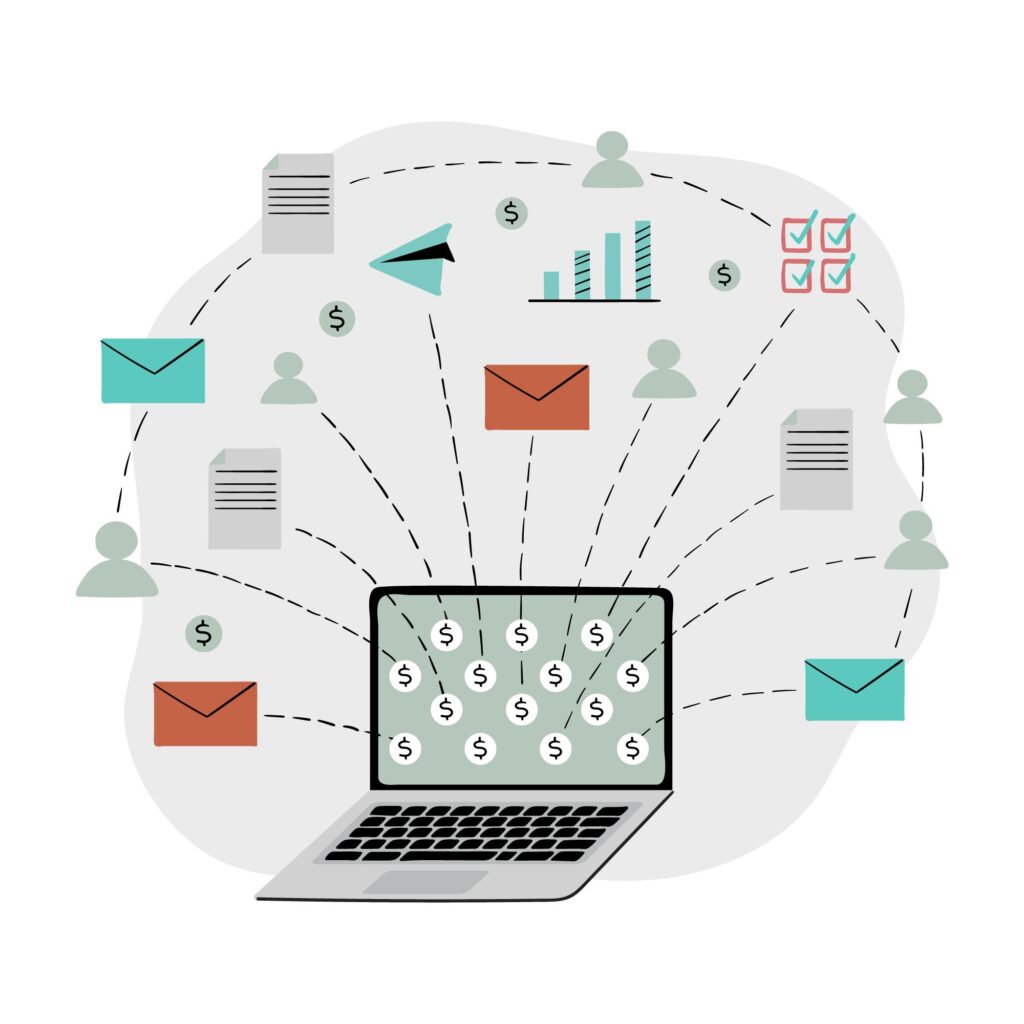
Key Takeaways
- Email marketing automation improves engagement by sending personalized messages based on specific events.
- Email marketing is essential for eCommerce businesses, increasing brand awareness, traffic, sales, and ROI cost-effectively.
- Implement eCommerce email marketing with the right tool, lead magnets, automated sequences, segmentation, mobile optimization, and thorough analysis.
- Effective email marketing examples for eCommerce include abandoned cart emails, welcome emails, product recommendations, promotions, and post-purchase follow-ups.
- Properly implemented email marketing can lead to business growth, customer loyalty, and successful goals for eCommerce ventures.
In today’s highly competitive eCommerce landscape, businesses must utilize every tool to stand out from the crowd.
One of the most effective and cost-efficient tools is email marketing for eCommerce.
With the ability to target and personalize messages, email marketing has become a crucial component of any eCommerce marketing strategy.
Not only does it help businesses increase brand awareness and build better customer relationships, but it can also drive sales and provide a high return on investment.
In this article, we will explore the numerous benefits and implementation of email marketing for eCommerce businesses and provide actionable tips on creating effective email campaigns.
So sit back, grab a cup of coffee, and dive in!
What is email marketing for eCommerce?

Email marketing for eCommerce is like having a smart shopping assistant who sends you special messages and offers directly to your email inbox.
Imagine you love shopping for cool gadgets online. When you sign up for a gadget store’s newsletter, they start sending you emails about their latest products, exclusive discounts, and upcoming sales.
For example, let’s say they send you an email with a 20% discount on the newest smartphone you’ve been eyeing.
That’s like a secret code that lets you buy the phone for a lower price! And when your birthday comes around, they might surprise you with a special birthday coupon as a gift.
The best part is, they remember your preferences and only send you things that match your interests. It’s like having your own personal shopper who knows exactly what you like.
So, email marketing for eCommerce is a clever way for online stores to keep in touch with their customers, offer them great deals, and make shopping more exciting and personalized.
It’s a win-win because customers get awesome deals, and stores get happy and loyal shoppers who keep coming back for more fantastic products!
Importance of email marketing for eCommerce business
Email marketing for eCommerce businesses is a powerful tool that can benefit businesses of all sizes.
Here are some additional reasons why email marketing is essential for eCommerce businesses:
1. Increased Brand Awareness
- Improved customer engagement
Email marketing allows businesses to stay in touch with their customers by providing regular updates, promotions, and relevant content.
By doing so, businesses can establish themselves as reliable and trustworthy sources of information, which can increase brand awareness.
- Increased website traffic
By including links to specific products, services, or landing pages in their email campaigns, businesses can drive traffic to their website, resulting in increased brand exposure.
2. Better Customer Relationships
- Personalized Communication
Email marketing automation allows businesses to personalize their communications, including greetings, product recommendations, and special offers.
Businesses can create a more intimate connection with their customers, increasing loyalty and retention.
- Increased customer lifetime value
Email marketing can help businesses increase customer lifetime value by providing personalized recommendations, cross-selling or upselling, and exclusive promotions.
3. Increased Sales
- Boosted revenue
Email marketing campaigns can drive sales by promoting products, offering discounts, and highlighting new or popular items. By doing so, businesses can increase their revenue and profit margins.
- Increased conversion rates
By providing targeted messaging and personalized promotions, email marketing campaigns can increase conversion rates and reduce cart abandonment, resulting in increased sales.
4. Cost-effective marketing
- Low cost
Email marketing is one of the most cost-effective forms of marketing, requiring minimal investment in software, design, and distribution.
Compared to traditional marketing methods, such as print or TV advertising, email marketing is much more affordable, making it an attractive option for small businesses.
- High ROI
Email marketing campaigns can generate a high return on investment (ROI) by driving sales and increasing customer lifetime value.
According to a study by DMA, email marketing has an average ROI of 42:1, meaning that for every dollar spent, businesses can expect to receive $42 in return.
Overall, email marketing for eCommerce businesses effectively increases brand awareness, builds better customer relationships, drives sales, and achieves a high ROI.
By implementing the best practices outlined in this article, businesses can leverage the power of email marketing to grow their business and achieve their goals.
How to implement eCommerce email marketing in steps
Email marketing for eCommerce businesses is a powerful tool that can help companies to reach and engage with their target audience.
To implement eCommerce email marketing, businesses can follow the following steps:
1. Choose the best email marketing tool
One of the essential steps to starting email marketing is to choose the right email marketing automation tool that fits the business’s needs.
There are several email marketing tools available in the market, such as Salesmate, Mailchimp, Drip, etc.
These tools offer various features like email templates, automated sequences, segmentation, and analytics, making it easier for businesses to send targeted emails to their subscribers.
2. Create a lead magnet
A lead magnet is an incentive businesses offer to their potential customers in exchange for their contact information, such as email addresses.
Creating a lead magnet is an effective way to attract subscribers to the email list. It could be anything from a free e-book, a discount code, a webinar, or a quiz.
3. Making your own sequences
Once the business has captured the leads, it’s time to develop a series of automated email sequences that are triggered by specific events, such as a new subscriber or a recent purchase.
These email sequences could include a welcome series, abandoned cart series, post-purchase series, and re-engagement series.
4. Segmenting your email list
Segmenting your email list is an effective way to send targeted messages to specific groups of subscribers.
Businesses can send personalized emails that resonate with their audience by segmenting the email list based on subscribers’ behavior, demographics, and interests.
5. Optimize your emails for mobile
With the increasing number of users accessing emails on their mobile devices, optimizing email campaigns for mobile is essential.
Businesses should ensure their email templates are mobile-friendly, with clear and concise messaging and easy-to-click call-to-actions.
6. Testing and Analyzing
The final step in implementing email marketing for eCommerce businesses is testing and analyzing the email campaigns’ effectiveness.
By tracking the email campaign’s performance, businesses can identify what’s working and what’s not and make necessary changes to improve the email marketing strategy.
Examples of email marketing for your eCommerce business

Email marketing is an effective way for eCommerce businesses to engage with their customers and drive sales.
Here are some examples of email marketing campaigns that eCommerce businesses can implement:
1. Abandoned cart emails
These emails are triggered when a customer adds items to their cart but does not complete the purchase.
Abandoned cart emails can be an effective way to remind customers of the items they left behind and encourage them to complete their purchases.
eCommerce businesses can offer incentives, such as a discount code or free shipping, to incentivize customers to complete their purchases.
2. Welcome emails
Welcome emails are sent to new subscribers when they sign up for an eCommerce business’s email list.
These emails provide an introduction to the brand and can include information about the business’s products or services, as well as any promotions or discounts that new subscribers may be eligible for.
3. Product recommendation emails
These emails suggest relevant products to customers based on their purchase history and browsing behavior.
By providing personalized product recommendations, eCommerce businesses can increase the likelihood that customers will make a purchase.
These emails can also include promotions or discounts to incentivize customers to make a purchase.
4. Promotional emails
Promotional emails can be used to promote sales, discounts, or other promotions that eCommerce businesses are running.
These emails can include product images, descriptions, pricing information, and any relevant promotional codes or links to the business’s website.
5. Post-purchase emails
These emails are sent to customers after they have made a purchase.
Post-purchase emails can include order confirmation information, as well as suggestions for related or complementary products that the customer may be interested in.
These emails can also include a request for customer feedback or reviews, which can be valuable for improving the business’s products or services.
By implementing these email marketing campaigns, eCommerce businesses can stay top-of-mind with their customers and drive sales.
How to create an effective email marketing campaign for eCommerce businesses
Creating an effective email marketing campaign for an eCommerce business requires careful planning and execution.
Here are some additional tips to help businesses create successful campaigns:
1. Understanding the target audience
In addition to segmenting the email list, it’s important to research and understand the target audience’s preferences, interests, and behaviors.
This can help businesses tailor their messaging and promotions to better resonate with subscribers.
2. Crafting the right message
Along with writing compelling subject lines, personalizing the content, and including clear calls-to-action, businesses can also experiment with different messaging strategies, such as storytelling or humor, to capture the audience’s attention.
- Subject lines
A/B test different subject lines to determine which ones perform the best and use that knowledge to refine future campaigns.
- Personalization
Take personalization to the next level by using dynamic content that changes based on the recipient’s past behavior, preferences, or location.
- Call-to-Action
Experiment with different types of CTAs, such as urgency-based or social proof-based, to encourage more clicks and conversions.
3. Designing engaging emails
In addition to using high-quality visuals and engaging content, businesses can also experiment with different email layouts and formats, such as interactive emails or GIFs, to make their emails stand out in the inbox.
- Visuals
Use user-generated content (UGC) or influencer collaborations to showcase products and build social proof.
- Content
Consider incorporating user-generated reviews or testimonials in the email content to build trust and credibility.
4. Measuring success
Businesses can go beyond tracking basic email metrics and use advanced analytics tools to gain deeper insights into their subscribers’ behavior and preferences.
- Metrics to track
Monitor metrics such as email engagement, revenue per email, and customer lifetime value to gain a more comprehensive view of the campaign’s effectiveness.
- How to analyze and improve
Use email analytics to gain insights into subscriber behavior and preferences, such as which products or categories are most popular, and use that information to refine future campaigns.
Conclusion
Email marketing for eCommerce businesses offers numerous benefits that can help them stay ahead of the competition.
By using effective email campaigns, businesses can increase their brand awareness, build better customer relationships, drive sales, and save on marketing costs.
With the right tools, strategies, and creativity, email marketing can be a powerful tool to engage customers and grow an online business.
So, if you’re an eCommerce business owner looking to boost your sales and customer loyalty, don’t overlook the power of email marketing – it can be a game-changer for your business!
